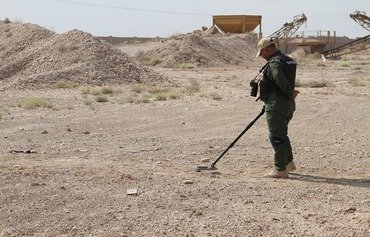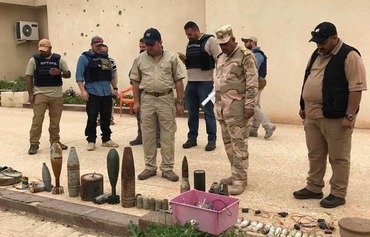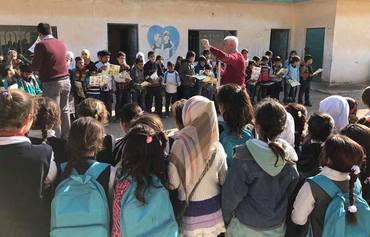Iraqi agencies are joining forces to speed up the process of removing mines and explosive remnants of war from areas liberated from the "Islamic State of Iraq and Syria" (ISIS), officials told Diyaruna.
Mines were the most deadly type of weapon that ISIS used, Iraqi Landmine Affairs Directorate head Khalid Rashad told Diyaruna.
"The terrorists booby-trapped several government buildings, private property and large areas in order to obstruct the liberation campaign and inflict as much harm as possible," he said.
The directorate is one of several agencies working to mitigate this life-threatening risk, Rashad said, noting that the presence of mines slows down operations to restore stability to liberated areas.
The ministries of defence and interior, specialist organisations and government contractors have joined the effort to remove explosive devices from public service facilities, he said.
In Ninawa and Anbar provinces, he said, "90% of infrastructure, including power and water plants, as well as schools and hospitals" have been cleared.
'Diabolical methods'
ISIS elements planted locally-manufactured improvised explosive devices (IEDs) using "diabolical methods", Rashad said, calling for continued joint efforts to remove all unexploded ordnance as soon as possible.
One of the group's techniques was to plant an intricate system of connected explosives in buildings and on roadsides, he said, concealing bombs in various locations such as electricity poles.
"Iraq currently is at the forefront of dismantling ordnance and locally-made landmines that are difficult to dismantle and are cleverly and expertly concealed," he said.
"Surveys and clearing of areas that were under the terrorist group are under way," he said, adding that the Landmine Affairs Directorate will soon announce detailed results of these joint efforts.
The new national strategy against landmines focuses on constructive co-operation in confronting and raising awareness about this danger as well as lending a helping hand to victims, Rashad said.
Mines 'still a threat'
The explosive remnants of war left behind by ISIS "still pose a threat to the local population", said Ninawa provincial council member Khalaf al-Hadidi.
"ISIS elements had planted their explosives everywhere, and they were expertly concealed in places no one could have dreamed of," he told Diyaruna.
Although hundreds of explosives have been deactivated, some have detonated when residents returned to their homes, he said, noting there had been civilian deaths last month in the towns of al-Qayyarah and Bashiqa.
"Several villages and towns in Ninawa are still contaminated with explosives and hazardous war remnants," al-Hadidi said.
These include the Old City of Mosul, Abta, Adam, al-Rahmaniya and al-Qayrawan, he said, calling on the government to step up its efforts to clear the areas and move civilians out of harm's way.
"Engineering efforts of the Ministry of Defence played a large role in clearing all the cities in the province from ISIS-planted mines," said Anbar provincial council member Athal al-Fahdawi.
"We currently have private sector companies that also are working on removing these explosives from infrastructure projects so that reconstruction efforts can commence and services can be restored," he told Diyaruna.
Talks are ongoing between the Anbar provincial council and the UN to locate and remove landmines and explosives planted in the desert and rural areas, he said.
The council also is working with the Anbar Operations Command to clear newly liberated areas of western Anbar from war remnants.

![An Iraqi engineering team receives instructions before removing mines from an area liberated from the 'Islamic State of Iraq and Syria'. [Photo from the Iraqi Landmine Affairs Directorate Facebook page]](/cnmi_di/images/2017/12/25/10775-Iraq-explosives-clearing-600_384.jpg)






